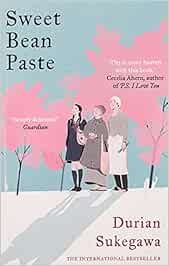3.5 Stars
I was looking for something a bit different to read and found glowing reviews of this Japanese novella about an unconventional friendship.
Sentaro Tsujii feels like a failure. With a checkered past, he has few opportunities so works in a tiny confectionary shop selling dorayaki, a type of pancake filled with sweet bean paste. Adrift, he feels his life has no purpose. One day, a 76-year-old woman, Tokue Yoshii, asks for a job. Her age, gnarled hands, and partially paralyzed face make him hesitate, but then he learns she makes the best sweet bean paste and so hires her. A friendship develops, one which changes Sentaro’s outlook on life.
Over time, Sentaro learns about Tokue’s life. She is reluctant at first to share her story, but eventually the truth is revealed. To say her past was harrowing would be an understatement. The author reveals a dark chapter in Japanese history when imprisonment, forced labour, sterilization and arbitrary punishment were the fate of those affected with Hansen’s disease. Though cured 40 years ago, Tokue still faces prejudice and ostracism.
The message of the book is that no existence is devoid of meaning. Tokue stresses that a person's worth lies not in their career or in their contributions to society, but simply in their being: “we were born in order to see and listen to the world. And that’s all this world wants of us.” A person’s life has meaning if he/she has simply observed or sensed the sky and wind. Tokue also emphasizes that joy can be found if people learn from nature and enjoy the wonder of life moment by moment, regardless of how restricted their circumstances.
This is not an action-packed book. What plot exists is predictable. Instead, the novel is gentle and meditative, both bittersweet and heart-warming. Parts are very sad, but in the end, it is uplifting and inspiring with its life-affirming message. Sweet Bean, a 2015 film based on this book, has been credited with helping Japanese society become fully aware of the existence of its outcasts.

No comments:
Post a Comment